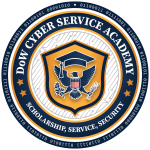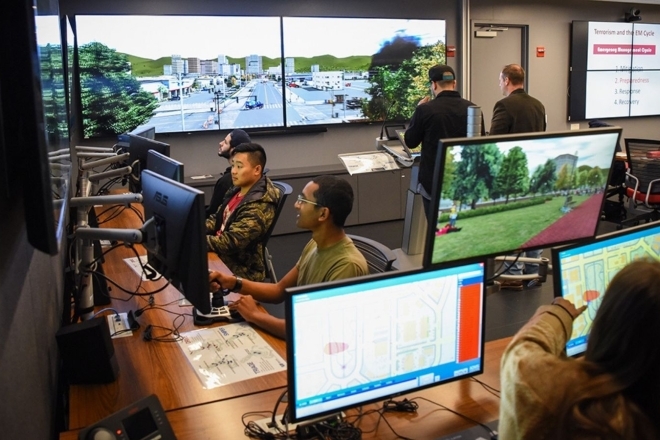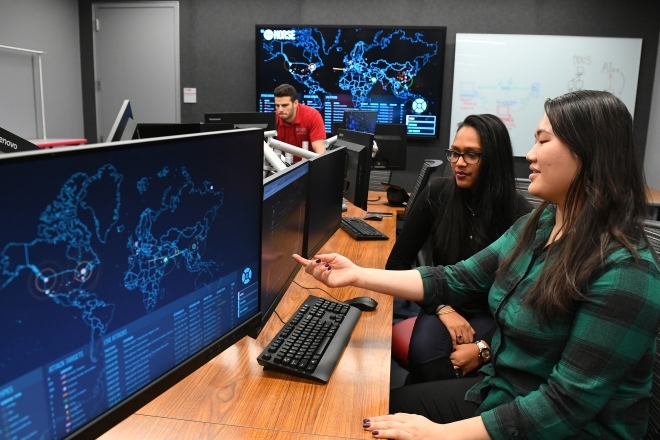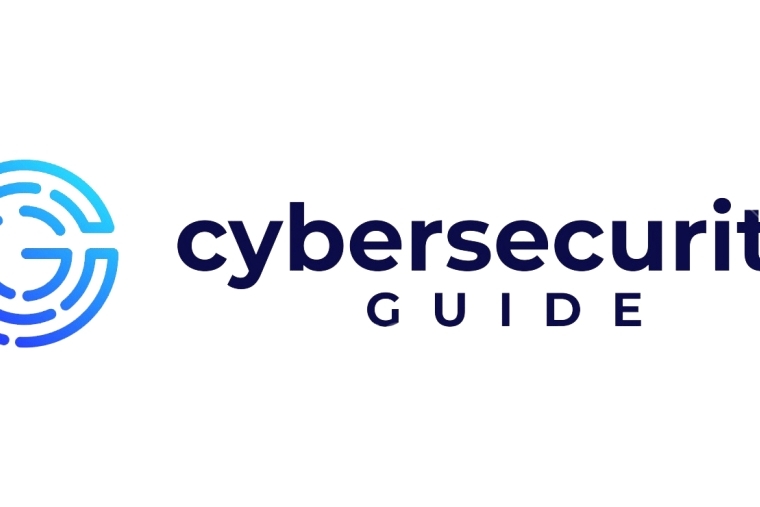

GR
Cyber and Information Security, Master of Science (M.S.)
St. John’s 30-credit master’s degree in Cyber and Information Security accelerates your career and transforms your world view through an immersive learning experience that connects you with the brightest minds in the field and state-of-the-art learning resources.
- Home
- Academics
- Majors and Programs of Study
- Cyber and Information Security, Master of Science (M.S.)
Why Cyber and Information Security?
Cybersecurity is a field that is accelerating rapidly. As more cybersecurity attacks occur, the demand for professionals adept in preventing and protecting against these attacks rises.
With a Master of Science degree in Cyber and Information Security, you enter a thriving career field with the proper skills and theoretical knowledge to set you apart. Our expansive curriculum was designed to elevate any person with an interest in computer science, data science, or information technology.
- Degree Type
- MS
- Area of Interest
- Computing & Technology
- Associated Colleges or Schools
- Program Location
- Queens Campus
- Online
- Required Credit Hours
- 30
- Associated Centers or Institutes
Contact Us
We are here to answer your questions about the Cyber and Information Security program and admission process.
Admission Requirements
All applicants must possess a bachelor’s degree from an accredited institution or the international equivalent before enrollment at the graduate level. In addition to the application form and non-refundable application fee, candidates should submit the following:
- Statement of professional goals and resume, which can be uploaded as part of the application for admission.
- Official transcripts from all undergraduate, graduate, and professional schools attended.
- One letter of recommendation obtained from a professional or academic reference.
- Official TOEFL, IELTS, PTE or Duolingo scores are required for applicants whose native language is not English.
- Students with international credits must submit a course-by-course foreign credit evaluation with GPA calculation from a NACES member.
*Base-level knowledge of programming and networking is required. This knowledge can be demonstrated with certifications, bootcamps, or online certificates, given the content is equivalent to approximately 40 hours of coursework on similar topics.
For additional information, please contact:
Office of Graduate Admission
[email protected]
718-990-1601
Secure Your Future in Cybersecurity

The U.S. Department of War (DoW) Cyber Service Academy offers a unique opportunity for undergraduate and graduate students in cybersecurity to receive financial support and hands-on experience through structured internships with the U.S. Department of War. Eligible students can receive up to $32,000 in funding, including allowances for books, room and board, and more.
Applications for 2025–26 New Student Recruitment and Returning Scholars are open.
Complete both application parts by February 17.
December 12: DoW CSA Program Office opens the new recruitment application
February 17: Online application portal closes for new recruitment scholars
May 1: Scholarship selection announcements begin
Fact Sheet
Coursework and Program Details
Please also see Degree Requirements below.
- CYB 611 Foundations in Cybersecurity (3 credits)
- CYB 615 Protection of Digital Infrastructure (Network Security) (3 credits)
- CYB 621 Cybersecurity Laws, Regulations and Best Practices (3 credits)
- CYB 625 Principles of Secure Scripting and Cryptography (3 credits)
9 credits from one of the following: Cyber Security, Data and Analytics, and IT Enterprise
Cyber Security
- CYB 711 Intrusion Detection and analysis (3 credits)
- CYB 715 Penetration testing and ethical hacking (3 credits)
- DFR 711 Cyber-Forensic and Malware Analysis (3 credits)
Data and Analytics
- CUS 510 Database Management Systems (3 credits)
- CUS 680 Distributed Big Data Analytics (3 credits)
- CUS 610 Data Mining and Predictive Modeling I (3 credits)
IT Enterprise
- IT 711 Enterprise Architecture and IT Governance (3 credits)
- IT 715 System Analysis and Process Re-engineering (3 credits)
- IT 721 IT Project Management and Agile Methodologies (3 credits)
- Capstone Option: CYB 790 Master’s Capstone Project (3 credits) and one additional elective course (3 credits)
- Master’s Thesis Option: a) CYB 795 Thesis I (3 credits) plus CYB 796 Thesis II (3 credits)
The extensive elective disciplines are expanding and currently Includee graduate coursework in Homeland Security, Computer Science, Data Science, Information Technology, and Digital Forensics.
Homeland Security
- HLS 102 Intelligence for Homeland Security: Organizational & Policy Challenges
- HLS 103 Critical Infrastructure: Vulnerability Analysis and Protection
- HLS 108 (becoming HLS 505) Enterprise Risk Management
- HLS 301 Police and Homeland Security Leadership
- HLS 302 U.S. Constitution and Homeland Protection
- HLS 303 Issues in Global Security
- HLS 305 Seminar in Global Terrorism
- HLS 306 Policy Formation and Analysis.
- HLS 307 Leadership Issues in Critical Incident Management
- HLS 312 Court Administration and Leadership
- HLS 320 Artificial Intelligence in Cybercrime Investigations
- 3 credits chosen from HLS 100 series electives or HLS 300 series electives
- Other HLS Electives offered per the Program Director's approval
Computer Science and Data Science
- CUS 510 Database System Design and Data Warehousing
- CUS 610 Data mining and Predictive Modeling
- CUS 680 Distributed Big Data Analytics
- CUS 752 Machine Learning
- CUS 620 Introduction to Programming for Analytics
Digital Forensics, Cybersecurity, and Information Technology
- CYB 798 Cyber Security Internship
- CYB 711 Intrusion Detection and Analysis
- CYB 715 Penetration Testing and Ethical Hacking
- DFR 711 Cyber-Forensic and Malware Analysis
- IT 711 Enterprise Architecture and IT Governance
- IT 715 System Analysis and Process Re-engineering
- IT 721 IT Project Management and Agile Methodologies
Enrollment and Graduation Data
| Year | Enrollment | Degrees Conferred |
|---|---|---|
| 2024 | 17 | 10 |
| 2023 | 9 | 6 |
| 2022 | 15 | 8 |
| 2021 | 15 | |
| 2020 | 9 |
**This data is based on new Graduate students who started the MS in Cyber and Information Security program in the following Fall semesters and graduated within two years.
What Sets St. John’s Cybersecurity Systems Program Apart
Top Cyber Security Colleges
St. John’s was recently ranked #8 by Spiceworks as one of the top cyber security colleges in the United States outranking many other well-known schools.
Cybersecurity Guide's Best Programs for 2025
Our Master’s in Cyber and Information Security program has been ranked #8 in Cybersecurity Guide's Best Programs for 2025.
Program Educational Objectives
Graduates of the M.S. Cyber and Information Security program should, within a few years of graduation:
- Build sound Cyber Security processes, research skills, and tools into and across the digital acquisition lifecycle.
- Practice Cyber Security professionally and with specific team technical leadership and stakeholder interdisciplinary communications skills while considering ethical and societal responsibilities.
- Attain technical roles or advanced graduate research in securing complex system.
Student Outcomes (Program-Level Learning Outcomes)
Graduates of the program will have the ability to:
- Analyze a complex problem and apply principles of computing and other relevant disciplines to elaborate solutions to it.
- Design, implement, and evaluate a computing-based solution to meet a given set of requirements in the context of the program’s discipline.
- Communicate effectively in a variety of professional contexts.
- Recognize professional responsibilities and make informed judgments in computing practice based on legal and ethical principles.
- Function effectively as a member and leader of a team engaged in activities appropriate to the program’s discipline.

“This program challenges your analytical mind and provides you with the right toolset to be successful in today’s cyber career field and provides leverage for advancement in IT management.”
Degree Requirements
When attending full-time, you may be able to earn your M.S. in as little as one year. Our program also offers flexibility to attend part-time and earn your degree in approximately two years as you continue working.
The Cyber and Information Security program aims to prepare you with the required qualifications to become Information Security Analysts, Information Technology Security Architects, and Data Security Analysts.
Our program offers a learning path flexibility with
- Hybrid courses with teaching both online and in-person.
- The ability for career changers or those with no undergraduate computer science background to use electives to acquire the required credits in programming and networking science.
- Capstone or thesis option. You can choose between a capstone project and one additional elective or a 6 credit thesis.
The M.S. degree program requires you to complete 30 credits* according to the following degree requirements. You must complete:
- core courses (12 credits)
- specialization (9 credits)
- elective course (3 credits)
- option of either capstone with additional elective (6 credits) or thesis (6 credits)
*Given this program is a 30-credit program (approximately 10 graduate classes), the onus is on the enrolled/matriculated graduate students that their full/part -time status complies with their financial requirements for the duration of the program. Graduate students are expected to work with the university financial office throughout their journey to ensure compliance. Please keep in mind that taking less than 3 courses in a semester will be considered part-time. If you are taking all 10 courses at St. John's, with no transfer credits, you will need to take at least one semester of 4 courses in the Fall or Spring with two additional semesters of 3 courses each semester to have full- time status each semester. If you are transferring credits and taking either 8- or 7- classes, again either two or one semester of 4 classes will be necessary in order to maintain fulltime status. (Summer classes may also be an option to explore.)
The Cyber and Information Security M.S. Program helped me flourish from a young, and eager student to a confident, and daring professional.
-Grace LaMalva, '22MS (Read Grace's full story on page 28 in St. John's Magazine)
Recognized Excellence: Awards and Designations Highlighting Our Program’s Distinction
NSA Designation
As of Feb 15, 2024 the M.S. program in Cyber and Information Security at St. John’s University is validated by the Department of Homeland Security (DHS) and the National Security Agency (NSA) as a Program of Study (PoS) in Cybersecurity through academic year 2029.
ABET Accrediated
The Cyber Security Systems, M.S. program is accredited by the Computing Accreditation Commission of ABET, under the commission’s General Criteria with no applicable program criteria
Recipient of the Inspiring Programs in STEM Award (2024)
St. John's University's M.S. Cyber and Information Security program has been honored with the 2024 Inspiring Programs in STEM Award by INSIGHT into Diversity magazine.
This prestigious award recognizes our unwavering commitment to the values of diversity, equity, and inclusion (DEI), which are deeply embedded in our programs and initiatives.


Cyber Security Center of Academic Excellence
This University-wide center has been created with the vision to provide current and future St. John’s students with cybersecurity program guidance and general information, as well as to promote collaboration and interaction with other students, faculty, and programs within St. John’s University and the cybersecurity community as a whole.

Sanford Family Cyber Lab
The Cyber Security Lab provides you with the opportunity to learn, apply, and practice cyber security. You work with software and employ techniques for intrusion detection, vulnerability mitigation, network perimeter defense, incident response, network forensics investigation, and malware analysis. The lab is used for both digital and hands-on forensic analysis and uses 2D and 3D cameras and visualizers to capture the hands-on activities and rebroadcast them “live” across the classroom and online.

Information Security vs Cyber Security
In the digital world we live in today, the terms “information security” and “cybersecurity” are often used interchangeably. However, despite their similarities, the two concepts have a few key differences that are important to understand.

U.S. Senator Kirsten Gillibrand Talks Cyber Security at St. John’s University
St. John’s University welcomed U.S. Senator Kirsten Gillibrand for a tour of the innovative Sanford Family Cyber Security Lab at the Queens, NY, Campus and a wide-ranging discussion of cybersecurity issues and career opportunities for students.
Life at St. John’s
St. John’s University offers a number of unique opportunities. Based in Queens, NY, you have access to a diverse student body and faculty with a wealth of experience. St. John’s also offers state-of-the-art learning resources, including our newly constructed cybersecurity lab.
Our program supports the core Vincentian values of compassion and service in providing you with technical skills that can be used to combat poverty, disease, crime, as well as provide solutions in health care.

“The M.S. Cyber and Information Security degree program has helped me develop the analytical skills needed for advancement in my career.” -Marc Zirillo ’22MS
Scholarships
The Common Application for the CELS Summer Research Fellowship Program, RISG Community Engaged Internship, and ANCHOR Summer Fellowship research programs are open.
Eligibility: Determine your eligibility and the requirements and to apply online.
Application Deadline: Friday, February 14, 2025
Program Research, Events, and Seminars
St. John’s University leads the way in innovation in this field by staying ahead of the emerging trends and incorporating these trends into our curriculum. Our faculty and students are involved in some of the most cutting-edge research and featured in prominent publications worldwide.
Explore upcoming events and seminars featuring top industry professionals and networking opportunities for students.
Academic Year 2025-2026
August 15-17, 2025
Hope Conference
St. John's University
Queens Campus
Click here to learn more.
February 28 - March 8, 2026
Study Abroad in Rome!
Click here to learn more and apply today!
Coming Fall 2025
Collaborative Online International Learning (COIL) Project - "Cyber In The Americas"
Check back soon for more details!
- United States and Territories 3rd-Party COVID-19 mHealth Contact Tracing: What are Security and Privacy Risks. International Journal of Internet of Things and Cyber-Assurance” - International Journal of Information Technology, Control and Automation 2023 | Dr. Suzanna Schmeelk, Shannon Roth, Christopher Shaw, Mughees Tariq, Julia Rooney, Emily Lackraj, Khalil Wood, John Kamen, Prof. Denise Dragos
- “Personalized Outsourced Privacy-Preserving Database Updates for Crowd-Sensed Dynamic Spectrum Access” - IEEE MELECON22 interdisciplinary international flagship conference | Dr. Erald Troja, Dr. Nikhil Yadav, student Laura M. Truong '22 CCPS
- “MobSF: Mobile Health Care Android Applications Through The Lens of Open Source Static Analysis” - 2020 IEEE MIT Undergraduate Research Technology Conference (URTC) | G. LaMalva and Dr.S. Schmeelk
- “Machine Learning Architecture for Signature-Based IoT Intrusion Detection in Smart Energy Grids” - IEEE MELECON22 interdisciplinary international flagship conference | Dr. Yadav, Dr. Troja, and Ms. Laura Truong
- Schmeelk S, Dogo MS, Peng Y, Patra BG. Classifying Cyber-Risky Clinical Notes by Employing Natural Language Processing. Proc Annu Hawaii Int Conf Syst Sci. 2022;2022:4140-4146. doi: 10.24251/hicss.2022.505. Epub 2022 Jan 4. PMID: 35528964; PMCID: PMC9076271.
- “Python Cryptographic Secure Scripting Concerns: A Study of Three Vulnerabilities” - Advances in Information and Communication. FICC 2023 | LaMalva, G., Dr. Schmeelk, S., Dinesh, D.
- “Ambient Intelligence Security Checks: Identifying Integrity Vulnerabilities in Industry Scripts” - Intelligent Systems and Applications. IntelliSys 2022 | Dr. Schmeelk, Shannon Roth, Julia Rooney, Mughees Tariq, Khalil Wood, John Kamen, Prof. Denise DragosSchmeelk, S. et al
- “Locating the Perpetrator: Industry Perspectives of Cellebrite Education and Roles of GIS Data in Cybersecurity and Digital Forensics” - Intelligent Computing. Lecture Notes in Networks and Systems, 2021 | Prof. Dragos and Dr. Schmeelk
- “Defending android applications availability” - IEEE 28th Annual Software Technology Conference (2017) | Dr.S. S. Schmeelk and Dr. A.A. Aho
- “Android Malware Static Analysis Techniques” - Proceedings of the 10th Annual Cyber and Information Security Research Conference (CISR '15) | Dr. S. Schmeelk and Dr. A. Aho
Academic Year: 2024-2025
Monday, November 3, 2025
Secure Coding Workshop
with Google Programmers
Josh Gordan and Yufeng Guo
12:15P M -2:00 PM
St. John's Hall Room 208
Click here to see the flyer
Tuesday, October 28, 2025
Hackathon 2025
Moderated by Dr. Kutub Thakur
7:00 PM - 9:00 PM
Marillac Room 308
Click here to see the flyer
Monday, April 28, 2025
AI Unleashed: Securing Tomorrow
2:00 PM - 3:00 PM
D'Angelo Center, 4th Floor
Click here to learn more!
Tuesday, March 25, 2025
Career Exploration at IBM
1:00 PM - 2:00 PM
St. Augustine Hall, 2nd Floor
Friday, March 21, 2025
UN on SJU
Tobin lobby area (room 103) in Bent Hall @ 10am
Cybersecurity in a Global Context
Study Cybersecurity in Rome, Italy, during the Spring 2025 semester!
Click here to learn more!
February 19 - 21, 2025
IEEE-HKN Pathways to Industry Conference
Don't miss this 3-day virtual event that prepares students to enter the workforce and advises young professionals on how to advance in their careers. Register for the conference and choose which sessions you want to attend: Come to one, two or all sessions. Registration fee covers all learning sessions, networking, and dedicated recruitment fair hours!
Click here to learn more!
Monday, December 9th, 2024
Short-Term Study Abroad Information Session
Dr. Suzanna Schmeelk and Professor Denise Dragos discuss the exciting details of the Cybersecurity in a Global Context Short-Term Study Abroad Program.
Click here to learn more!
Thursday, December 5th, 2024
Career Pathways in Cybersecurity with EC-Council
Learn about the steps you need to take to achieve your desired career goal in Cybersecurity!
Click here to learn more and here to view a PowerPoint of the talk!
Monday, November 25th, 2024
i on Hunger Food Packing Event
Protiviti and St. John's are partnering with Rise Against Hunger to pack meals for those in need.
Click here to learn more!
Friday, November 15th, 2024
AI in Mathematics Education
Mathematical understanding is fundamental in the understanding of critical cybersecurity mitigations and underlying system design (e.g. cryptography, risk, and intrusion detection, among many other elements).
Click here to learn more and register!
Academic Year: 2023-24
Wednesday, April 24th, 2024
U.S. Senator Kirsten Gillibrand Talks Cyber Security at St. John’s University
Click here to read the article!
Monday, April 8th, 2024
Am I AI?
Click here to view our flyer!
Saturday, March 16th, 2024
AI Hackathon Event
Click here to view our flyer!
Cybersecurity in a Global Context
Study Cybersecurity in Rome Italy, during the Spring 2024 semester!
Click here to learn more!
Monday, November 13th, 2023
Generative AI and Cybersecurity
Click here to view our flyer!
Monday, September 11th, 2023
CyRM: Mastering the Management of Cybersecurity Risk
Click here to view our flyer!
Academic Year: 2022-23
Saturday, May 27th to Sunday, May 28th, 2023
TechTogether NY
Click here to view our flyer!
Monday, April 24, 2023
Cybersecurity in a Global Context
Click here to view our flyer!
Friday, April 14, 2023
IPv6 and Its Impact on Cybersecurity, Emerging Technologies, and the Future of Internet
Speaker: Charles Sun
Click here to view our flyer!
Tuesday, February, 14, 2023
Producing Secure Software in Large Scale Agile Environments
Speaker: Professor Fernando Almeida
Click here to view our flyer!
Academic Year: 2021-22
Monday, November 14th, 2022
Tactical Advantages for Healthcare Cybersecurity
Speaker: Brian Tschinkel, VP/CISO Weill Cornell Medical College
Click here to view our flyer!
Thursday, September 29, 2022
Building a CyberSecure Workplace: What are We Doing Wrong
Speaker: Joel D. Offenberg
Click here to view our flyer!
Monday, April 11, 2022
Who Tracks the Trackers?
Speaker: Dr. Dane Brown
Click here to view our flyer!
Tuesday, November 9, 2021
A Case Against the Smart Things
Speaker: TJ O'Connor
Click here to view our flyer!
Monday, October 18, 2021
CSIRT and Threat Intelligence/Threat Management
Speaker: Anish Bachu
Click here to view our flyer!
Wednesday, September 8, 2021
The Internet of ‘Insecured’ Things
Speaker: Tyson Brooks
Click here to view our flyer!
AI Opportunities
Break Through Tech AI Program (Cornell University)
Break Through Tech, an initiative of Cornell University, offers a free, virtual, one-year extracurricular AI program for students interested in artificial intelligence, machine learning, and data science. Participants build foundational skills over the summer, work on real industry projects during the academic year, and gain hands-on experience with industry-standard tools—along with mentorship, career coaching, and internship support.
Applications are now open for the 2026–2027 academic year and close on February 16, 2026. Participants earn a Machine Learning certificate from Cornell University and receive a financial award upon completing the program.
Click here to apply.
AI4ALL IGNITE
AI4ALL Ignite is a career accelerator program offered at no cost to students, equipping you with in-demand, hands-on technical skills for AI internships and early career roles. You'll gain industry connections, industry-specific career readiness guidance, a certificate of completion, and a responsible, human-centered approach to AI.
Click here to apply.
Cybersecurity Industry Advisory Board
Our program advisory board includes alumni and experts in the field of cybersecurity in various positions including faculty, Chief Information Officers, Certified Information Systems Security Officer, and directors for top organizations including , Mandelbaum Salsburg, New Jersey courts, the Open Worldwide Application Security Project, the Protiviti Computer Security Incident Response Team, Reed Elsevier, the Respond Software Industry, Trellix, and Vectra AI.
Meet Our Faculty




Cyber Security Job Postings for St. John's University Students
Assistant United States Attorney at Department of Justice/US Attorney's Office
Employer: Department of Justice/US Attorney's Office Expires: 03/23/2026 If you are looking for an exciting and challenging career, this is the position for you! With a talented workforce of over 100,000 people, the mission of the Department of Justice is to uphold the rule of law, keep our country safe, and protect civil rights.
Embedded Software Engineer at Objective Interface Systems
Employer: Objective Interface Systems Expires: 03/23/2026 The Embedded Software Engineer's primary role is to help customers by deploying our product and troubleshooting existing deployments within their networks.· Advance the quality and customer satisfaction of products by identifying and bringing new, leading-edge techniques and methodologies for designing developing, producing, testing,
Senior Artificial Intelligence Advisor at KeyLogic
Employer: KeyLogic Expires: 03/22/2026 KeyLogic is seeking an experienced Senior Artifical Intelligence Advisor to guide artificial intelligence initiatives in support of the U.S. Department of Energy (DOE). This role will shape how AI enhances scientific discovery, accelerates R&D, modernizes operations, and strengthens mission impact across the complex.
AI Cybersecurity Developer/Engineer at GRIT Dynamics
Employer: GRIT Dynamics Expires: 03/22/2026 About the RoleWe are seeking an entry-level AI Cybersecurity Developer Engineer to join our growing team at the intersection of artificial intelligence, cybersecurity, and modern development.
Cybersecurity Analyst at Kenfont
Employer: Kenfont Expires: 03/22/2026 Hello Professionals,We have an exciting opportunity that matches your profile and experience.Please review the job details below and apply using the link above if you are interested.Position: Cybersecurity Analyst / SOC AnalystLocation: RemoteEmployment Type: Full TimeWork Mode: Remote Job Title: Cybersecurity Analyst / SOC AnalystExperience: 2–8 YearsLo
BAS Applications Engineer at HDC Automation, Inc.
Employer: HDC Automation, Inc.
From the Blog

10 Must-Have Skills for Cyber and Information Security Careers
Cyber and information security job requirements can vary based on the position, field, or focus of work. Yet, there are 10 key essential skills that will help you be successful in any job you choose as a cyber and information security professional.

Adventuring Through Rome: My Week Studying Abroad as a Grad Student
Read how a cybersecurity grad student from St. John’s University in Queens, NY, faced fears, explored Rome, and gained career and life lessons through studying abroad.
Tomas Medina
Facts and Questions

Elevate Your World
New York is just one of the remarkable places the St. John’s community calls home.

Success Starts Here
We are committed to providing you with the information needed to navigate and understand the process.

Resources
Visit the Cybersecurity Guide for Master’s in Cybersecurity Degree Essentials

2024 Inspiring Programs in STEM Award by INSIGHT into Diversity magazine
St. John's University's M.S. Cyber and Information Security program has been honored with the 2024 Inspiring Programs in STEM Award by INSIGHT into Diversity magazine.
This prestigious award recognizes our unwavering commitment to the values of diversity, equity, and inclusion (DEI), which are deeply embedded in our programs and initiatives.
Office of Graduate Admission
Michelle Bae
Graduate Admission Representative
[email protected]

Karen Mangan
Graduate Admission Representative
[email protected]

Sasha Velez
Graduate Admission Counselor
[email protected]
718-990-2025
Interested in Computing & Technology , but not sure if Cyber and Information Security, Master of Science (M.S.) is right for you?
Related Programs
UG
By majoring in Computing and Machine Learning at St. John's, you build the technological proficiency necessary to meet the challenges of the 21st century.
- Queens Campus
GR
Learn the wide spectrum of emerging technologies and its role as catalyst to achieve strategic and competitive advantage in the global market with an M.B.A. concentrating on Information Systems from St. John's University.
- Queens Campus
- Online
Dual
Earn your dual degree from St. John's University!
- Queens Campus
UG
The central goal of the Associate degree in Information Technology in the Collins College of Professional Studies is to prepare students either to enter the job market or to move on to a 4-year degree program leading to the Bachelor of Science in Information Technology, or to another related 4-year degree program at St. John’s University.
- Queens Campus
UG
Degree prepares graduates for careers as: software and infrastructure architects/developers; information/network security analysts; database managers.
- Queens Campus
UG
For highly-motivated students, St. John’s College of Liberal Arts and Sciences offers a combined Bachelor of Science (B.S.) and Master of Science (M.S.) program in Information Technology and Library and Information Science. The program allows you to complete your undergraduate and graduate degrees in five years of full-time study, with internships available at the graduate level.
- Queens Campus
UG
Networking Systems at St. John's University is a professional curriculum built upon a liberal arts core. The Networking Systems major, offered to both day and evening students, is designed to provide both a comprehensive education leading to such initial careers as telecommunications analyst, systems analyst, network manager, and first-line supervisor and a solid preparation for further academic and professional study in networking, computer science, and decision sciences.
- Queens Campus
UG
Networking Systems at St. John's University is a professional curriculum built upon a liberal arts core. The Networking Systems major, offered to both day and evening students, is designed to provide both a comprehensive education leading to such initial careers as telecommunications analyst, systems analyst, network manager, and first-line supervisor and a solid preparation for further academic and professional study in networking, computer science, and decision sciences.
- Queens Campus
UG
St. John's University's Networking Systems major provides a comprehensive education leading to initial careers as a telecommunications analyst, systems analyst, network manager and first-line supervisor. The program offers a a solid preparation for further academic and professional study in network engineering and computer science.
- Queens Campus
UG
Networking Systems/ Business Administration, Bachelor of Science / Master of Business Administration
Networking Systems at St. John's University is a professional curriculum built upon a liberal arts core. The Networking Systems major, offered to both day and evening students, is designed to provide both a comprehensive education leading to such initial careers as telecommunications analyst, systems analyst, network manager, and first-line supervisor and a solid preparation for further academic and professional study in networking, computer science, and decision sciences.
- Queens Campus
Take the Next Step

Explore Affordability
The Office of Student Financial Services is committed to providing students and their families with the information they need to navigate and understand the financial aid and payment process.
Apply to St. John's
St. John’s offers a free online application for all 100+ undergraduate programs, and graduate applications carry a low cost for most programs.

